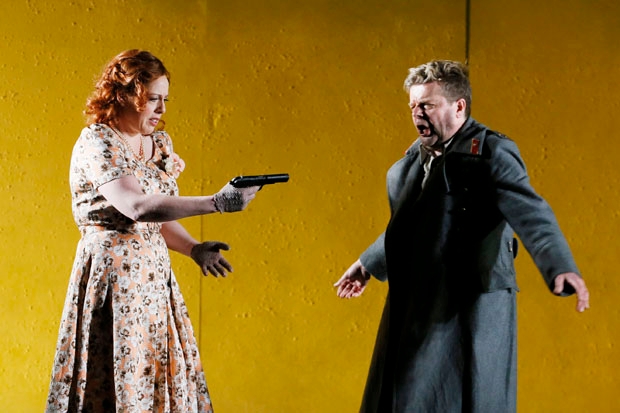The opera director David Alden has never been one to tread the straight and narrow. Something kinky would emerge, I’m sure, even if he directed the Queen’s televised Christmas message. So matching him up at English National Opera with the madness, obsessions and phantasmagoria of Tchaikovsky’s whirring and troubling The Queen of Spades was simply asking for trouble. The Alden fingerprints quickly emerge. We’re in several periods at the same time: Pushkin’s Imperial Russia, yes, but also Stalin’s ossified Soviet Union, plus splashes of the frivolous 1920s and 60s and a snatch of the 18th century. Fashions and hemlines keep darting around: Red Army uniforms, thigh-crawling cocktail numbers, hookers’ sleaze, and, for Felicity Palmer’s Countess, what might be Miss Havisham’s nightdress. There is cross-dressing, of course, an unnecessary gang rape, a far from innocent intermezzo pastorale, and a loopy irruption of animal heads, lifted, it seems, from a ‘furry fandom’ subculture of which I was blissfully ignorant before.
If only you could grab this production by the neck and shake out its silly clutter. Even at their fussiest and nuttiest, the fancies of Alden and his bold designer Gideon Davey (lots of sliding panels, dowdy walls and stacked chairs) never induce utter boredom. But when the stage has enough air and the anguish of Tchaikovsky’s drama takes hold, the show often throbs with unusual power. All sideshows stop for the Countess’s memory-lane excursion ‘Je crains de lui parler la nuit’ — unforgettable here, particularly in its whispered reprise as Palmer stands lonely and frail as a crumbling leaf. This deeply felt and lived-in performance would make a ticket worthwhile on its own. After early hiccups on opening night, Peter Hoare’s querulous brand of tenor came into its own as Hermann’s wits crumbled scene by scene. There’s characterful work, too, from Nicholas Pallesen’s rotund-toned Yeletsky, Gregory Dahl’s cynical Tomsky, and, once you discount her irksome costumes, the chameleonic Pauline of Catherine Young.
Admittedly, there’s a distance surrounding Giselle Allen’s Lisa that helps make her obsessive love for Hermann share the temperature of a fishmonger’s slab. But any shortfall in passion there should be balanced against the ferocious force of the reinvigorated ENO chorus and the orchestra’s sheer gusto and sheen. For that, above all, we must cheer conductor Edward Gardner. This 2014–15 season, his last as ENO’s music director, began with his lacerating Otello — another, wiser Alden production — and he’s lost none of his puff in the intervening months. Arms flung wide, he pummels and coaxes every musician to deliver the authentic Tchaikovsky heartache, audible in every string throb and woodwind bleat. He’ll be much missed.
Compared with Alden’s shock and awe, John Fulljames’s Così fan tutte, starting Garsington Opera’s season, offers much ado about not very much. Friday’s wind didn’t help — the cold evening gusts that often invade Wormsley’s Opera Pavilion at 9 p.m. and brings on the rugs and shivers. In better circumstances I might have huddled up and remained quite happy. But by this time there were other burdens to bear. Mozart’s plot mechanism had reached the point when anyone sensible wants the love-swap business quickly resolved, not stretched out with a rolling pin. And Fulljames’s production was falling apart, its directorial wheezes thrown pell-mell, hit or miss, quickly followed by Dick Bird’s costumes. This staging, I felt, had been put together by someone with an overflowing in-tray.
Earlier on, there was more profit than loss. Useful ironies and visual panache sprang from Fulljames’s central conceit, with action and characters placed on the fringe of a couple’s wedding party. And some good voices entertained us. Mozart’s two heroines started off scowling with mysterious viciousness, but no muddy intentions clouded Kathryn Rudge’s creamy mezzo as Dorabella, or the flightier games of Andreea Soare’s Fiordiligi. As Guglielmo, Ashley Riches showed all the incisiveness of someone who enjoys the Times crossword and playing squash (I quote from the programme’s chatty CVs). Robin Tritschler’s Ferrando had slightly less vocal lustre, while Neal Davies’s Don Alfonso needed an extra infusion of mischief. No grouses at all, though, about Lesley Garrett’s amusing Despina, tottering round staccato in high heels.
In the first season fully under his own control, Garsington’s artistic director Douglas Boyd, who lives on a pig farm, conducted his forces with wisdom, wit, and a relish for ensemble attack that didn’t always reach Friday’s singers. The golden stretch was the closing ensemble of the Act One finale: sharp as a pin, each of the six voices clear as a bell. Lovely! Then came the cold, the thumb-twiddling, and the directorial mess. Still, no gang rape; no animal heads.






Comments